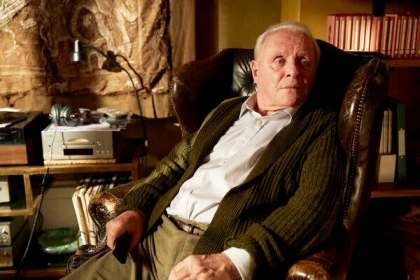 Anthony Hopkins turns in one of his greatest performances in this portrait of a man becoming increasingly lost to dementia.
Anthony Hopkins turns in one of his greatest performances in this portrait of a man becoming increasingly lost to dementia.
The Father is a film about an elderly man suffering from dementia. It started in 2012 as a French play by Florian Zeller, and last year Zeller directed this movie version, which stars Anthony Hopkins, adapting the play into an English script with the help of the renowned screenwriter Christopher Hampton. Now, as unfair as it is, I automatically thought, “Oh, another really sad movie about dementia.” But Zeller’s play, and film, take a radically different approach than I expected.
Zeller wrote the film with Anthony Hopkins in mind. His character was renamed Anthony in this English version—in the play it was Andre. We first see him listening to opera in his London flat when his daughter Anne, played by Olivia Colman, comes to check on him. His interactions with Anne alternate between love and irritation. She’s upset that he has chased off yet another caretaker that she’d hired to look after him. He had acted threatening towards this latest nurse, claiming that she was a thief and had stolen his watch. Anne says that she can’t take care of him if he keeps scaring off the help that she hires. Anthony is adamant that he doesn’t need help, and that he’s fine and can take care of himself. At the end of this troubling conversation, Anne reveals that she is leaving, moving to Paris. She has fallen in love with someone and is going to live with him there. It’s evident that she was previously married, but that it hadn’t worked out. Now she will try once more to find a nurse that he can accept, but if he can’t, then… The sentence goes unfinished, but we can guess what she means: a nursing home.
In this deceptively simple first scene the framework is established for the entire film. From then on, Anthony’s world becomes increasingly difficult to understand. He finds a strange man sitting in his kitchen, who when asked says that this is his flat and that he’s Anne’s husband. Then when Anne comes home, Anthony doesn’t recognize her, and in fact it’s a different actress. In successive scenes throughout the film, the truth becomes less and less clear. When he mentions the man who says he’s her husband, Anne says, “What man?” People’s identities are seeming to shift and switch constantly. Again and again, experiences that we have witnessed along with Anthony are contradicted by later experiences that seem strange and baffling.
What Zeller has done is tell the story from the subjective point of view of Anthony. The bewilderment when people he doesn’t recognize say that they know him. The shock of sudden changes that only he seems to notice. The terror that the dementia sufferer experiences when reality stops making sense is depicted so vividly that we, the audience, feel lost ourselves, unable to make sense of the twisting and turning plot. And of course Anthony insists on his version of events, because this is what he sees, and to admit to himself that he’s losing his mind is too painful—he must maintain some kind of grip on reality at all costs.
Is this what dementia sufferers actually experience? There’s no way of knowing, but the real answer is that the film is using a theatrical method for evoking the nature of what someone with dementia goes through. A good example is the brilliant production design in which Anthony’s flat keeps changing, ever so subtly, from scene to scene. The décor is different, the furniture in different places.
Colman is wonderful as the daughter, and the rest of the supporting cast is excellent. But the secret ingredient is Anthony Hopkins. He absolutely nails this part. His character can turn on the charm, and do a good imitation of someone who is competent. Then he can suddenly shift into fierce malicious sarcasm and rage. Helpless, talkative, fearful, suspicious, arrogant towards his daughter but also needy—Hopkins makes this man into an utterly convincing complex human being lost in the labyrinth of his own mind. The film doesn’t condescend to pity. The style seeks to replicate instead the ruthlessness of the disease.
The tension, the pressure in this film, builds and builds to an ending that is so shattering that I’m still on the verge of tears when I think about it. In The Father, we witness, with a direct intensity stronger than I can express, the terrible gulf between a suffering mind and an increasingly unfriendly world.

Vince Gilligan presents an exciting follow-up to his popular TV series Breaking Bad, in which we learn the fate of Jesse, one of the...

Young men compete in a punishing walking race for which there can only be one survivor, in an adaptation of a Stephen King allegory...

A documentary illuminates the life, and especially the bold work, of the groundbreaking Japanese artist Yayoi Kusama. Japanese artist Yayoi Kusama is one of...